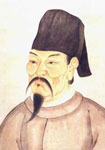《敕赐百官樱桃(时为文部郎)》王维 翻译、赏析和诗意
敕赐百官樱桃(时为文部郎)
芙蓉阙下会千官,
Under the lotus gate, thousands of officials gather,
紫禁朱樱出上阑。
Crimson cherries from the Forbidden City blossom on the palace railings.
才是寝园春荐后,
Only after the garden of talent blooms in spring,
非关御苑鸟衔残。
Do birds sing in the imperial garden with remnants of cherries in their beaks.
归鞍竞带青丝笼,
Returning to their horses, officials vie to carry baskets of fresh cherries,
中使频倾赤玉盘。
Imperial messengers eagerly pour cherries into red jade plates.
饱食不须愁内热,
Satisfied with the feast, they need not worry about feeling overheated,
大官还有蔗浆寒。
For high officials, there is cool cane juice to enjoy.
诗意:这首诗是唐代诗人王维写给自己时为文部郎时敕赐百官樱桃的情景。描绘了当时花园中樱桃盛开的壮丽景象,以及官员们欣喜不已地品尝樱桃的情景。诗中通过花园中的樱桃象征春天的来临和繁荣,表达了作者对美好时光和富裕生活的向往。
赏析:这首诗以唐代官员们敕赐樱桃为背景,以描绘樱桃的美丽景象为主要内容,寄托了作者对美好时光和繁荣生活的向往。诗中使用了许多生动形象的描写,如芙蓉阙下会千官、紫禁朱樱出上阑等,展现了樱桃盛开时的热闹和喜悦氛围。通过对官员们竞相品尝樱桃的描写,展现了樱桃的珍贵和官员们的喜爱。最后,通过描述大官们享受清凉蔗浆的场景,表达了作者对富贵生活的向往和渴望。整首诗意境明快高远,形象描写准确生动,语言简练流畅。
《敕赐百官樱桃(时为文部郎)》王维 拼音读音参考
chì cì bǎi guān yīng táo shí wéi wén bù láng
敕赐百官樱桃(时为文部郎)
fú róng què xià huì qiān guān, zǐ jìn zhū yīng chū shàng lán.
芙蓉阙下会千官,紫禁朱樱出上阑。
cái shì qǐn yuán chūn jiàn hòu,
才是寝园春荐后,
fēi guān yù yuàn niǎo xián cán.
非关御苑鸟衔残。
guī ān jìng dài qīng sī lóng, zhōng shǐ pín qīng chì yù pán.
归鞍竞带青丝笼,中使频倾赤玉盘。
bǎo shí bù xū chóu nèi rè, dà guān hái yǒu zhè jiāng hán.
饱食不须愁内热,大官还有蔗浆寒。
“才是寝园春荐后”平仄韵脚
拼音:cái shì qǐn yuán chūn jiàn hòu
平仄:平仄仄平平仄仄
韵脚:(仄韵) 上声二十五有
